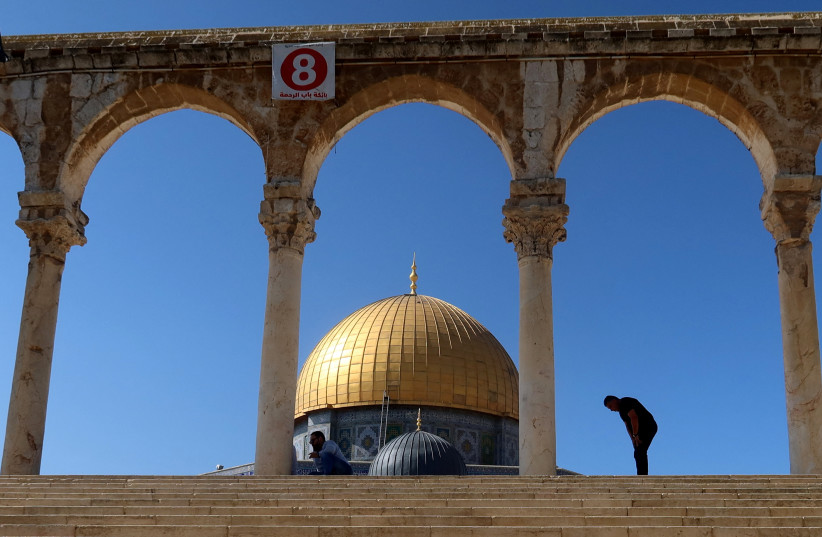In some three weeks, depending on the New Moon and the decision of the Wakf Islamic religious trust, the month-long Ramadan period will begin here in Israel. After fasting during daylight hours, Muslims will conduct festive meals during the evening hours. And already, Israel’s security services are planning how to confront the situation.
It is not the celebration period that is of concern but how to deal with any outbreaks of violence, which have become a staple of the month.
As some news outlets are reporting, National Security Minister Itamar Ben-Gvir is seeking approval for the police being able to ban Arabs from Judea and Samaria visiting the Temple Mount during Ramadan.
According to Channel 12, the Shin Bet (Israel Security Agency) and the IDF support only an under-45-year-old restriction. As for Muslims who are Israeli citizens, there also will be an age ban, while the Shin Bet recommends no age limitation.
Ben-Gvir was quoted as saying that Israel “cannot take chances and risks in allowing residents from the [Palestinian] Authority to enter Israel in any way.”

He added, “It can’t be that women and children are hostages in Gaza and we allow Hamas victory celebrations on the Temple Mount.”
As this paper posted on Sunday, Ben-Gvir, responding to criticism, said: “The positions of some security officials who recommend approving the massive entry of PA residents to the Temple Mount show that they learned nothing from October 7.”
In the past few years, the Friday prayer congregations at the Temple Mount’s al-Aqsa Mosque, inside and out, have numbered in the many tens of thousands. In this reality, Israel’s police have allowed pro-Hamas rallies to take place, with shouting of slogans of incitement and the waving of pennants and posters, uninterrupted. Arrests or detentions are a follow-up procedure, after review of long-distance surveillance or press photographs.
What has developed, however, is a feeling by the more extreme elements, elements that are becoming not only more extreme but more numerous, that they are being provided a certain license to promote anti-Israel and anti-Jewish provocations, even if no overt violence occurs at the moment.
Exclusive Muslim control
THE EXCLUSIVE Muslim control over the sacred compound, enshrined by the 1967 Moshe Dayan-promoted status quo, which all of Israel’s governments have adopted as principled policy, has been adjusted.
Despite the ruminations from many quarters, including King Abdullah II of Jordan, that Israel has been violating its terms, it is quite clear from the 1994 Israel-Jordan peace treaty that that is not so.
As its Article 9 makes clear, “Each party will provide freedom of access to places of religious and historical significance.... The Parties will act together to promote interfaith relations... with the aim of working towards religious understanding... [and] freedom of religious worship, and tolerance....”
At present, the police permit discrete communing, as long as it is short, usually a minute or two, conducted at a far eastern section of the compound and done with no noise or overt actions. For example, prostrations are an offense, with the violator liable to be arrested or, at the least, immediately removed.
In contradistinction, at the Cave of the Patriarchs in Hebron, Jews and Muslims pray under the same roof with almost none of the disruptions, vocal or physical.
Seeking to confront this situation, the Wakf has promoted, or allowed to be so promoted, the practice of i’tikaf, which is marked by praying and sleeping in al-Aqsa Mosque overnight. This has provided the opportunity for stones, fireworks, and Molotov cocktails to be amassed, and, as dawn breaks, the hooligans stream out and attack the first group of Jews who enter at 7 a.m. Worse, as happened during Sukkot in 1990 and several times since, they will toss rocks over the wall on Jews gathered at the Western Wall below the Mount.
In April 2023, just a year ago, violent confrontations took place when, after the evening Ramadan prayer, Muslims barricaded themselves inside the mosque. In the resulting disorders, Israeli police arrested 400, with 50 being injured.
More than once, such contretemps served as an excuse for rockets to be fired, as happened notably in April 2021 when, after disturbances at the Damascus Gate, worshipers were turned away from the Friday Ramadan prayer. Riots occurred at the compound, and, in short time, rockets were fired from Gaza.
Exploiting the Temple Mount, unfortunately, is a longtime tactic of the Muslims. A banner reading “Al-Aqsa is in Danger” appeared at the 1920 Arab Congress in Jerusalem. Haj Amin al-Husseini used that slogan in his 1921 election campaign for the position of mufti. In 1929, despite all the denials of the Jewish institutions and parties that they wanted to tear down al-Aqsa, Husseini again employed the slogan to characterize the Jewish campaign on behalf of their rights at the Western Wall.
IS THERE a possibility that some form of compromise or accommodation can be reached at the holy site? At the moment, that is quite doubtful.
In the first instance, all foreign leaders have adopted the phrase “the importance of upholding the historic status quo at the Haram al-Sharif/Temple Mount,” so why should the Muslims yield on their position?
Secondly, without the support of the Chief Rabbinate, the pro-Temple Mount activists lack full recognition and can easily be minimized.
Thirdly, the security services seek quiet, and any act of expressing such lawful liberties, which even the High Court of Justice has recognized, would draw inflammatory rhetoric and actions that disturb the peace, no matter who is right.
If peace is to be achieved, one based on compromise and coexistence, the sharing of the Temple Mount must reach an acceptable accommodation.
The writer is a researcher, analyst, and opinion commentator on political, cultural, and media issues.
